لماذا دعي دير مار مرقس في أورشليم باسم الانجيلي مار مرقس ؟
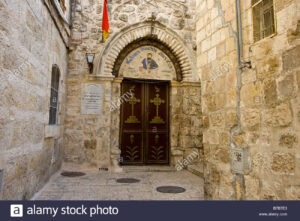
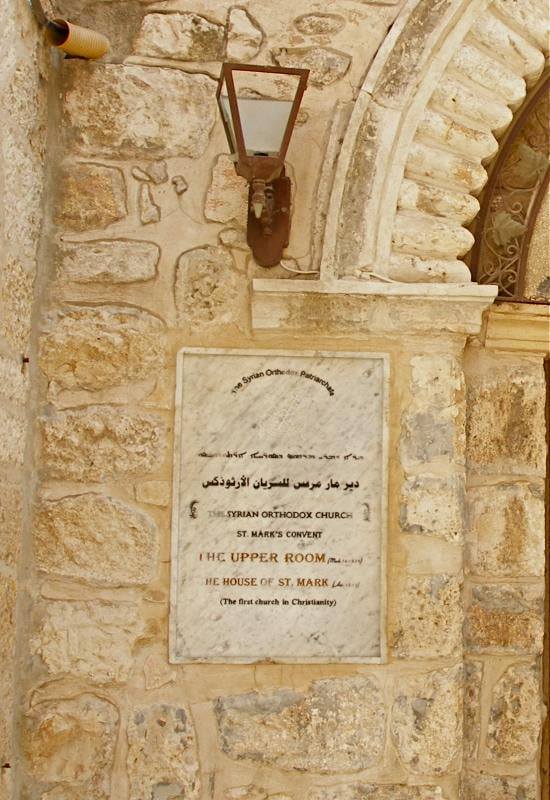



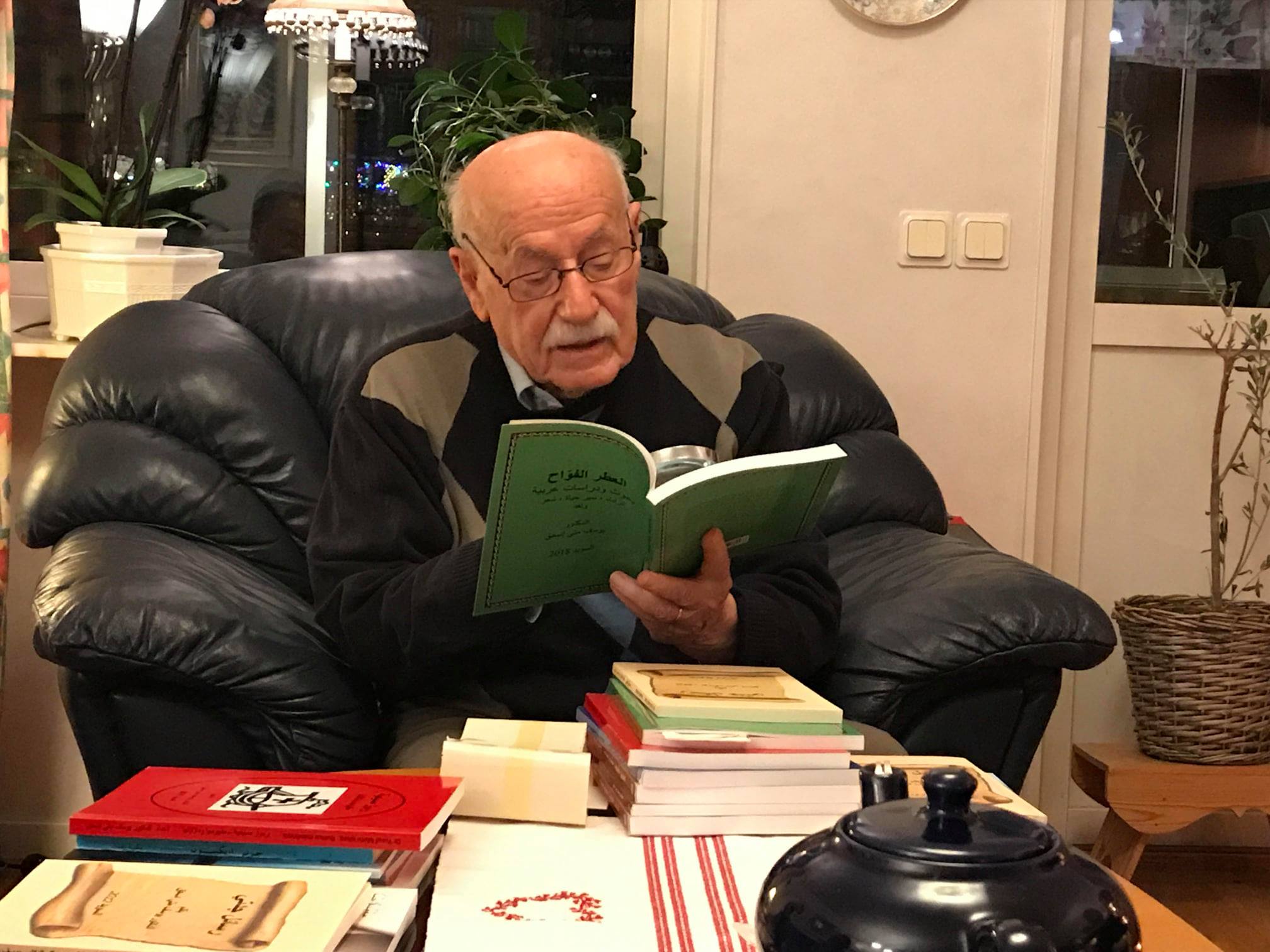
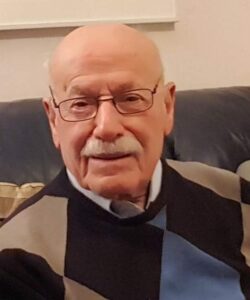

ܪܘܼܚܐ ܕܙܰܒܢܐ
ܣܘ̈ܟܠܐ ܕܝܘܠܦܢܐ ܕܪܳܚܫܝܼܢ ܒܪܘܼܚܐ ܕܙܒܢܢ܆ ܬܳܒܥܝܢ ܥܳܒܘܿܕܘܼܬܐ ܘܒܳܥܝܢ ܡܰܦܪܝܳܢܘܼܬܐ. ܘܰܡܢܰܨܚܝܢ ܠܦܬܝܼܚܘܬܐ ܪܰܟܝܟܬܐ ܘܰܡܥܰܦܩܳܢܝܬܐ. ܘܠܐ ܨܳܒܝܢ ܒܚܳܫܘܿܫܘܼܬܐ ܦܟܝܼܪܬܐ ܘܐܰܛܝܼܡܬܐ ܗܿܝ ܕܒܘܼܝܳܢܐ ܕܕܘܼܒܪܗܿ ܣܟܝܼܪ ܗ̱ܘ ܠܡܨ̈ܥܳܝܐ ܕܫܳܓܪܝܼܢ ܚܰܝܠܐ ܘܡܳܙܓܝܼܢ ܚܘܼܒܐ ܘܐܝܼܩܪܐ ܘܝܘܼܬܪܢܐ ܠܗܘܼܒܳܒܐ ܘܫܘܼܘܫܳܛܐ ܕܒܪܢܫܐ ܘܓܰܘܐ. ܕܣܘܼܢ̈ܩܢܐ ܕܢܳܩܫܝܼܢ ܒܬܰܪܥܐ܆ ܪܕܝܢ ܘܙܳܪܒܝܼܢ܆ ܘܢܳܦܨܝܼܢ ܠܡܬܰܚܡܘܼܬܐ ܗܿܝ ܕܡܬܚܰܒܫܐ ܘܡܬܚܰܒܨܐ ܒܠܚܘܕ ܒܕܝ̈ܠܢܳܝܬܐ. ܘܩܳܪܝܢ ܘܰܡܙܰܡܢܝܼܢ ܠܥܶܢܝ̈ܢܐ ܡܒܰܢܝ̈ܢܐ ܘܐܣܳܪ̈ܐ ܡܫܰܓܢ̈ܝܳܢܐ ܡܛܠ ܫܘܼܘܫܳܛܐ ܪܥܝܳܢܝܐ ܘܗܘܒܒܐ ܕܝܡܘܩܪܛܝܐ.
ܘܐܢܐ ܡܗܝܡܢ ܐ̱ܢܐ ܕܣܘܼܠܳܩܳܐ ܗܰܘܢܳܢܳܝܐ ܕܡܙܝܥ ܠܣܘܼܢܩܳܢܐ ܗܢܐ܆ ܠܐ ܢܳܨܚ ܐܠܐ ܒܢܘܼܗܪܐ ܘܫܒܝ̈ܠܐ ܕܪܘܼܚܐ ܕܫܘܼܡܠܝܐ. ܗܕܐ ܕܰܡܙܰܝܚܐ ܠܚܘܼܒܐ ܕܐܠܗܐ ܘܕܩܪܝܒܐ. ܘܰܡܥܰܦܩܐ ܠܟܠ ܒܠܥܕ ܦܘܼܪܫܢܐ ܓܶܢܣܳܢܳܝܐ ܘܛܘܼܗܡܳܢܳܝܐ ܘܫܰܪܒܬܳܢܳܝܐ ܘܐܰܬܪܢܳܝܐ ܘܦܢܝܼܬܳܢܳܝܐ ܘܬܘܕܝܼܳܬܢܳܝܐ ܘܪܥܝܳܢܳܝܐ ܒܬܰܡܝܼܡܘܬܐ ܘܥܪܝܼܡܘܬܐ ܐ̱ܢܳܫܳܝܬܐ ܕܠܝܬ ܒܗܿ ܚܢ̈ܝܐ ܣܩܝܼܪ̈ܐ.
ܒܕ ܗܘܼ ܒܪܢܫܐ ܡܶܬܥܰܫܢ ܘܝܳܪܒ ܟܕ ܙܳܪܥ ܒܚܰܘܣܢܐ ܘܟܕ ܗܿܘܐ ܫܦܝܼܥܐ ܒܥܘܼܬܪܐ ܣܘܼܟܳܠܳܝܐ ܘܗܘܼܠܢܝܐ ܘܫܪܟܐ ܕܟܟܪ̈ܐ ܘܡܘܗ̈ܒܬܐ ܘܛܒ̈ܬܐ ܕܡܫܬܪ̈ܬܚܢ ܠܗ ܡܼܢ ܐܠܗܐ. ܗܿܘ ܕܝܳܕܥ ܘܚܳܟܡ ܫܪܪܐ ܗܢܐ܆ ܡܬܚܰܦܛ ܒܪܘܼܚܐ ܕܫܘܼܡܠܳܝܐ܆ ܘܡܥܰܕܪ ܘܡܬܥܕܪ. ܗܿܘ ܕܡܶܬܥܰܕܪ܆ ܡܶܬܥܰܫܢ. ܗܿܘ ܕܡܶܬܥܰܫܢ܆ ܡܰܟܫܪ ܘܡܰܨܠܚ. ܘܗܿܘ ܕܡܰܨܠܚ܆ ܘܡܰܟܫܪ ܠܐ ܗܿܘܐ ܩܶܛܪܐ ܐܠܐ ܫܪܳܝܳܐ ܒܣܘ̈ܟܠܐ ܕܐܶܢܰܚܢܳܝܘܼܬܐ…
«ܚܠܦ ܫܘܪ̈ܐ ܢܒܢܐ ܓܫܪ̈ܐ: ܢܓܫܘܪ ܘܠܐ ܢܫܘܪ»
ܝܘܣܦ ܒܓܬܫ
ܚܘܕܪܐ ܕܡܪܕܘܬܐ ܘܣܦܪܝܘܬܐ ܕܠܫܢܐ ܣܘܪܝܝܐ. ܡܪܕܝܢ ܡܕܝܢܬܐ ܥܬܝܩܬܐ.

ܣܘܼ̈ܟܳܠܐ ܕܡܶܠܬܐ
ܓܠܝܼܙܘܼܬܐ ܕܐܒܗ̈ܐ ܒܳܪܝܳܐ ܡܝܰܬܡܘܼܬܐ. ܘܰܓܠܝܼܙܘܼܬܐ ܕܒܘܼܝ̈ܐܐ ܣܦܝܼܩܘܼܬܐ. ܘܗܝܼ ܗܕܐ ܠܐ ܡܶܬܡܰܠܝܐ ܐܠܐ ܒܣܘܼ̈ܟܳܠܰܝ ܡܠܬܐ.
ܐܰܟܡܳܐ ܕܡܬܬܡܝܼܫܐ܆ ܕܳܡܶܐ ܒܰܪܢܳܫܐ ܠܝܰܬܡܳܐ ܕܡܬܢܰܘܰܠ ܘܡܶܫܬܰܢܰܩ ܒܚܰܫܐ ܘܟܘܼܪܗܢܐ ܩܶܨܬ ܡܰܘܒܕܳܢܘܼܬܐ ܘܐܰܒܝܼܕܘܼܬܐ ܕܣܘ̈ܟܳܠܝ ܡܶܠܬܐ…
ܒܪܡ ܙܕܩ ܕܢܶܕܥ ܠܐ ܓܳܢܝܢ ܘܐܦܠܐ ܐܳܒܕܝܼܢ ܣܘܼ̈ܟܳܠܝ ܡܶܠܬܐ ܒܰܪܩܝܼܥܳܐ ܕܫܪܪܐ…
ܐܢ ܢܳܝܕܝܼܢ ܛܘܼܪ̈ܐ. ܘܐܢ ܦܳܩܥܝܼܢ ܫܘܿܥ̈ܐ. ܘܐܢ ܡܶܨܛܰܪܝܢ ܩܰܒܪ̈ܐ. ܘܐܢ ܡܬܟܰܪܟܐ ܫܡ̈ܝܐ ܐܝܟ ܡܓܠܬܐ….
ܘܬܘܼܒ… ܘܬܘܒ… ܘܬܘܒ… ܠܐ ܓܳܢܝܢ ܘܐܦܠܐ ܐܳܒܕܝܼܢ ܣܘܼ̈ܟܳܠܝ ܡܠܬܐ….!
ܐܠܐ ܩܳܛܝܢ ܘܟܳܪܟܝܼܢ ܠܟܳܐ ܘܰܠܟܳܐ ܘܦܳܝܫܝܼܢ ܟܕ ܛܥܝܼܢܝܼܢ ܪ̈ܶܡܙܝܗܘܢ ܘܪ̈ܶܬܝܰܝܗܘܢ ܚܟܡ̈ܬܳܢܳܝܐ ܥܕܡܐ ܕܢܫܟܚܘܢ ܠܗܘܢ ܐܰܦܢܳܐ «ܟܐܡܬ ܚܰܩܠܐ ܟܰܗܝܼܢܬܳܐ ܕܚܳܝܪܐ ܠܫܶܡܫܳܐ ܘܚܳܫܚܳܐ ܠܙܰܪܥܐ» ܕܒܗܿ ܢܡܘܼܬܘܢ ܘܢܶܬܩܰܒܪܘܢ ܘܢܶܬܢܰܚܡܘܢ ܐܝܟ ܦܪܕܬܐ ܕܚܶܛܬܐ ܠܡܶܬܰܠ ܦܐܪ̈ܐ ܣܓܝ̈ܐܐ…
ܝܘܣܦ ܒܓܬܫ
ܚܘܕܪܐ ܕܡܰܪܕܘܼܬܐ ܘܣܶܦܪܳܝܘܼܬܐ ܕܠܫܳܢܐ ܣܘܼܪܝܝܐ. ܡܪܕܝܢ

ܡܰܪܬܝܳܢܘܼܬܐ ܕܥܳܢܘܳܝܳܐ
ܒܰܕܡܘܼܬ ܫܘܼܡܢܐ ܐܝܬܝܗܿ ܚܶܟܡܰܬ ܝܘܼܬܪ̈ܢܐ ܕܡܬܢܣܒܝܼܢ ܡܼܢ ܡܰܘ̈ܥܶܐ «ܡܝ̈ܳܥܐ» ܕܡ̈ܬܠܐ ܘ̈ܦܠܐܬܐ… ܕܓܳܫܦܝܼܢ ܘܩܳܝܬܝܼܢ ܒܕܘ̈ܟܝܳܬܐ ܚܶܫܘ̈ܟܳܬܐ ܘܥܰܩܪ̈ܳܬܐ ܪܚܝܼܩܐܝܬ ܡܼܢ ܟܠ ܚܰܝܠܐ ܩܛܝܼܪܳܝܐ ܓܰܘܳܝܳܐ ܘܒܰܪܳܝܳܐ. ܘܚܳܙܩܝܼܢ ܘܙܳܪܙܝܼܢ ܘܚܳܝܨܝܼܢ܆ ܐܢ ܩܰܛܝܼܢܐܝܬ ܡܬܬܡܝܼܨܝܢ ܘܡܬܚܰܟܡܝܼܢ…
ܘܡܬܦܰܪܣܐ ܡܰܪܬܝܳܢܘܼܬܐ ܕܡܬܠܐ ܗܢܐ ܡܛܠ ܣܘܼܟܳܠܗܿ ܐܢܢܩܝܐ ܠܗܿܠܝܢ ܕܒܳܥܝܢ ܕܢܶܩܪܘܢ ܘܢܶܙܕܰܘܕܘܢ ܡܼܢ ܚܶܟܡܰܬ ܝܘܼܬܪ̈ܢܝܗܿ. ܒܕ ܣܘܼ̈ܟܠܐ ܕܰܡܝ̈ܟܐ ܘܐܰܒܝ̈ܕܐ ܒܰܙܒܢ ܣܢܝܼܩܝܼܢ ܠܡܬܬܥܝܼܪܳܢܘܼܬܐ ܘܡܶܬܠܰܒܛܳܢܘܼܬܐ!
ܡܬܐܡܪܐ ܕܠܡ ܒܚܕ ܡܢ ܝܘ̈ܡܝܢ ܫܐܠܘܗܝ ܐܢ̈ܫܝܢ ܠܥܢܘܳܝܐ ܣܒܐ ܟܕ ܐܡܪܝܼܢ ܠܗ: «ܠܐ ܥܳܐܦ ܐܢ̱ܬ ܟܝ ܟܠܗ ܗܢܐ ܙܒܢܐ ܐܢܬ ܒܠܚܘ̇ܕܰܝܟ؟
ܦܰܢܝ̣ ܥܢܘܝܐ: «ܐܝ̣ܬ ܠܝ̣ ܣܓܝ̣̈ܐܬܐ ܠܡܥܒܕ. ܙܕܩ ܠܝ ܠܡܕܰܪܳܫܘ̣ ܠܬܪܝܢ ܒܳܙܝ̣̈ܩܐ، ܘܠܬܪܝܢ ܢܶܫܪ̈ܐ ܘܠܡܰܫܠܳܝܘ ܠܬܪ̈ܬܝܢ ܐܪ̈ܢܒܐ، ܘܰܐܠܦ ܠܚܶܘܝܐ ܘܰܐܙܝ̣ܥ ܠܚܡܳܪܐ ܘܶܐܫܰܝܶܢ ܠܐܪܝܐ.»
ܐܡܪܝܢ ܠܗ: ܒܪܡ ܠܐ ܚܳܙܝܢܢ ܚܕܳܪ̈ܝܟ ܚܝ̈ܘܬܐ ܐܟܡܐ ܕܐܡܪ ܐܢ̱ܬ، ܐܝܟܐ ܐܢܝܢ؟
ܦܢܝ ܥܢܘܝܐ ܘܐܡ̣ܪ: «ܗܠܝܢ ܚܰܝ̈ܘܬܐ ܐܢܝܢ ܕܚ̈ܐܝܢ ܠܓܘ ܡܢܢ»
«ܬܪܝܢ ܒܳܙܝ̣̈ܩܐ ܡܿܢ ܨܳܦܚܝܼܢ ܥܠ ܟܠ ܡܐ ܕܚܳܙܝܢ. ܛܒܐ ـ ܘܒܝ̣ܫܐ، ܡܰܘܬܪܢܐ ـ ܘܡܰܚܣܪܢܐ. ܙܕܩ ܠܝ̣ ܠܡܰܠܦܘ̣ ܐܢܘܢ ܕܢܦܪܫܘܢ. ܡܛܠ ܕܗܠܝܢ ܥܰܝ̈ܢܝ ܐܢܝܢ.»
«ܘܬܪܝܢ ܢܫܪ̈ܐ ܕܝܢ ܣܳܪܚܝ̣ܢ ܘܰܡܫܝܼܡܝܼܢ ܘܡܒܰܣܒܣܝܢ ܠܟܠܡܐ ܕܓܳܫܦܝ̣ܢ ܒܗ. ܙܕܩ ܠܝ ܕܐܠܶܦ ܐܢܘܢ ܕܢܥܰܕܪܘ̣ܢ ܘܢܫܰܡܫܘܢ ܒܠܥܕ ܡܰܟܝܳܢܘܼܬܐ. ܕܗܠܝܢ ܐܝܕ̈ܝܐ ܕܝܠܝ ܐܢܘܢ.»
«ܐܪ̈ܢܒܐ ܒܟܠܙܒܢ ܥܳܪ̈ܩܳܢ ܘܕܳܚ̈ܠܳܢ ܘܡܬܛܰܫ̈ܝܢ ܙܕܩ ܠܝ ܠܡܰܫܠܝܘ ܐܢܝܢ، ܘܐܠܦ ܐܢܝܢ ܠܡܩܳܡ ܒܐܦ̈ܝ ܥܰܣ̈ܩܳܬܐ. ܕܠܐ ܢܥܪ̈ܩܳܢ ܒܙܒܢ ܩܶܨܐ ܐܘ ܢܣܝܘܢܐ. ܒܗܝ ܕܗܠܝܢ ܪ̈ܓܠܝ ܐܢܝܢ.»
«ܗܿܘ ܡܐ ܕܰܥܣܶܩ ܗ̱ܘ ܡܼܢ ܟܠ ܕܐܶܥܰܩܒ ܠܚܶܘܝܐ. ܗܿܝ ܕܐܦܢ ܬܗܘܐ ܦܟܝܼܪܐ ܘܰܩܦܝܼܠܐ ܒܰܩܠܘ̣ܒܝܐ ܚܙܝܼܩܐ܆ ܐܡܝܢܐܝܬ ܡܛܰܝܒܐ ܠܡܶܨܦܰܚ ܘܰܠܡܶܕܒܰܨ ܘܠܰܡܣܰܡܳܡܘܼ ܠܟܠܢܫ ܕܩܪܝ̣ܒ ܠܗܿ. ܥܠܗܕܐ ܙܕܩ ܠܝ ܕܐܥܰܩܒܝܗܿ ܘܐܗܘܐ ܪܰܕܝܐ ܘܰܡܛܰܟܣܐ. ܡܛܠ ܕܠܫܢܝ ܗ̱ܝ.»
«ܐܟܡܐ ܕܝܕܝܥܐ ܠܟܠܢܫ ܗܘܼ ܚܡܳܪܐ ܥܰܪܢܐ ܗ̱ܘ «ܘܥܶܨܝܳܝܳܐ» ܣܰܓܝ. ܘܥܳܡܠܐ ܗ̱ܘ ܠܐܝܐ ܠܣܰܘܦܳܐ ܐ̱ܚܪܝܐ. ܘܠܐ ܒܳܥܐ ܕܢ̣ܩܘܡ ܒܗܠܝܢ ܕܝܠܗ. ܡܛܠܗܕܐ ܙܕܩ ܠܝ ܕܐܠܦܝ̣ܘܗܝ ܠܡܰܘܕܝܘ̣ ܘܢ̣ܗܘܐ ܒܪܶܕܝܐ. ܡܛܠ ܕܗܢܐ ܓܘ̣ܫܡܐ ܕܝ̣ܠܝ ܗ̱ܘ.»
«ܘܒܚܪܬܐ ܕܝܢ ܒܳܥܐ ܐܢܐ ܕܶܐܫܰܝܢ ܠܐܪܝܐ ܗܿܘ ܕܒܳܥܐ ܕܢܰܡܠܟ ܘܰܢܫܰܡܰܪ ܦܘ̣ܩܕ̈ܢܐ ܠܟܠܢܫ. ܘܒܳܥܐ ܕܢ̣ܗܘܐ ܚܬܝܪ ܘܫܰܒܗܪܳܢ. ܘܒܠܚܘܕ ܚܕܳܪ̈ܘܗܝ ܢܦܬܘܿܠ ܥܠܡܐ. ܝܐܐ ܠܝ ܠܡܪܰܒܝܘ̣ ܘܠܡܶܪܕܐ ܠܐܪܝܐ ܗܿܘ. ܒܗܿܝ ܕܢܰܦܫܐ ܕܝܠܝ ܗ̱ܘ.»
«ܐܟܡܐ ܕܚܳܙܝܢ ܐܢ̱ܬܘܢ ܦܘ̣ܠܚܢܐ ܣܓܝܐܐ ܐܝܬ ܠܝ ܠܡܥܒܕ.»
ܢܘܗܪܐ: ܠܘܼܩܳܛܐ ܗ̱ܘ ܡܰܬܠܐ ܗܢܐ ܫܘܼܥܝܼܬܳܢܳܝܐ ܕܥܳܢܘܳܝܐ. ܘܡܰܥܒܰܪ ܡܼܢ ܬܘܪܟܝܐ.
ܝܘܣܦ ܒܓܬܫ
ܚܘܕܪܐ ܕܡܰܪܕܘܼܬܐ ܘܣܶܦܪܳܝܘܼܬܐ ܕܠܫܳܢܐ ܣܘܼܪܝܝܐ. ܡܪܕܝܢ
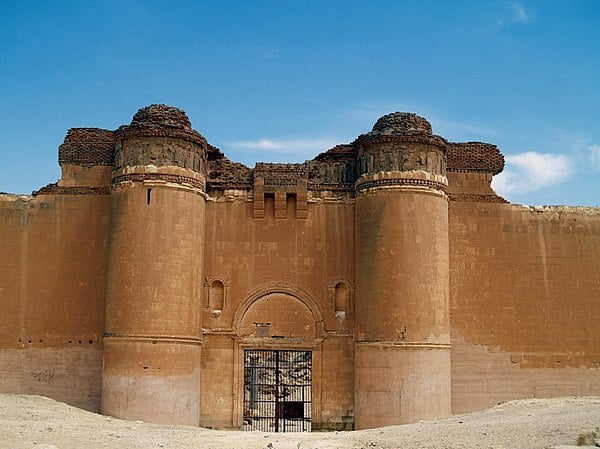
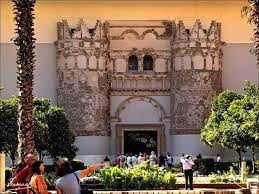
ܟܬܒ̈ܐ ܣܘܪ̈ܝܝܐ كتب سريانية
التنقيط-في-لوحة-المفاتيح-السريانية الصعود-الجديد-للقراءة-السريانية اللغة-الآرامية المدرّج دروس-القراءة-السريانية-الجزء-الاول دروس-القراءة-السريانية-الجزء-الثاني طريقة-جديدة-في-تعلم-اللغة-الآرامية-السريانية قواعد اللغة السريانية للخوري نعمت كتاب-اولف-بيث

The Inner Door and Absolute Truth
“Here I am! I stand at the door and knock.
If anyone hears my voice and opens the door,
I will come in and eat with that person, and they with me.”
(Revelation 3:20)
Absolute truth is constantly knocking on the door of our inner world. Like the words of Scripture, the fact that the inner door is being knocked is very sobering and valuable for mindful people.
How can someone who has not been enlightened by the true meanings of this sobriety and value open the door that is being knocked? How can someone who lacks humane capabilities, poor of human virtue, and with warped mind follow these moral rules of sobriety and value?
Absolute truth means divine truth. It means being familiar with the divine mysteries. It means remembering our essence, knowing ourselves, waking up to the truth, being enlightened, being aware, not forgetting our true identity, knowing our rights and place in the light of those mysteries. The knowledge and mysteries of this truth conduce to our heart, mental, and spiritual awakening. It helps our inner world find balance and stability with the awareness of this awakening. As it flows and interacts inside us, it inspirits our world of meaning and stimulates and spices up our living spaces. What is important here is being open to the warnings of the truth/essence as well as that we do not shut our inner doors and withdraw into ourselves. There is no form of blindness more frightening and dangerous than for a person to shut their inner door and withdraw into themselves. Because this situation causes one to both drift apart and be estranged from the essence. Those who do this fall so far from the divine mysteries that they experience the pain of self-alienation. These people always think and act as though only others are to blame for everything. “Why do you look at the speck of sawdust in your brother’s eye and pay no attention to the plank in your own eye?” (Matthew 7:3).
It is impossible to explain the truth to such people. You have to reach them in order to explain it to them. The problem is that you can’t reach them. They are absent from their own houses and spirits. They are always outside. They are always traveling in unreasonable, dead-end places. No matter how hard you knock on their door with divine truth, you will not hear a single sound in answer and the door will not open. They are absent from their own houses. Since they strangle the spirit and word inside a shell, they have either forgotten or lost their true identity. And they cannot return to their homes because of mental barriers and stumbling blocks….
Well, who will open the door to Him -the divine truth who always knocks on the door of our house? If no one is inside, if the house is empty, who will hear the knocking on the door? If the inner house is not clean, how will He enter and make Himself comfortable?
This is the main issue that pushes people to anxiety and worry. What matters is staying home so that one can open the door. What matters is being at home. Keeping the house clean. What matters is opening the door to absolute truth so that it may come and dwell with us. What matters is receiving Him nicely and sharing a meal in our inner house. What matters is being enlightened and enlightening others with the transformations and reflections of this reception. Thus, the way to the divine perspective/life that is forgotten with over-attachment to the material world. A happy and stable life within the social reality is possible thanks to this way which leads closer to the divine essence.
However, if the owner of the house is not at home, who will be the host? In other words, it will be easier for troublemakers and shady and hostile characters to invade and take up residence there. However, if the owner of the house is at home, unwelcome visitors will have a more difficult time getting in. Entering becomes optional.
The main mission of the church and the chief task of the servant stewards who bear the spiritual vision of this awareness, is to have the owner of the house stay at home and help clean that house for the owner’s comfort. To disinfect it in a spiritual sense, if that is possible…
Whichever path a human takes, he himself is the starting point. It has to be. The internalization of the meanings has to the main goal in order to transition from the person who thinks he knows, to a person who knows himself, that is, the program of the self. It should be remembered that any initiative and change (and even effort) that does not start or spring up from the person’s inner world cannot be successful. Based on this vital awareness, Saint Anthony (251-356) gives us that important and well-known reminder of his with the words, “To know God, you must first know thyself.” And in this sense, he has made a breakthrough in the understanding of hidden meanings.
As it is written, “One of the beauties of knowing that one does not know is being able to observe oneself, realizing what one looks like from the outside and undertaking self-discovery. Those who do not know, know themselves. Striving to understand and learning are not an act of storing knowledge in the brain, but an endeavor to free the mind and soul. Learning something requires first and foremost knowing that one does not know. It is humanly impossible to learn something that one thinks they know.”
Saint Aphrem of Nsibis (303-373), who likened humans to the house of God, gave us this warning 1700 years ago: “If your house is honored when you host an important person, imagine the honor of hosting the master of everything within yourself. Leave no filth inside your thoughts, which have become a temple. Do not leave anything inside the home of God that will upset him. Let God’s home be adorned with things that are worthy of Him.”
Yusuf Beğtaş
Syriac Language-Culture and Literature Association – MARDİN